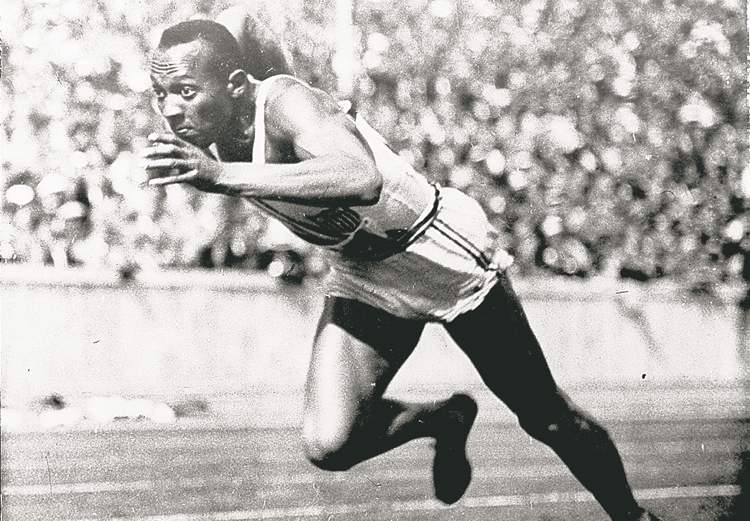Film examines Olympic hero’s German triumph, U.S. tragedy
Advertisement
Read this article for free:
or
Already have an account? Log in here »
To continue reading, please subscribe:
Monthly Digital Subscription
$0 for the first 4 weeks*
- Enjoy unlimited reading on winnipegfreepress.com
- Read the E-Edition, our digital replica newspaper
- Access News Break, our award-winning app
- Play interactive puzzles
*No charge for 4 weeks then price increases to the regular rate of $19.95 plus GST every four weeks. Offer available to new and qualified returning subscribers only. Cancel any time.
Monthly Digital Subscription
$4.99/week*
- Enjoy unlimited reading on winnipegfreepress.com
- Read the E-Edition, our digital replica newspaper
- Access News Break, our award-winning app
- Play interactive puzzles
*Billed as $19.95 plus GST every four weeks. Cancel any time.
To continue reading, please subscribe:
Add Free Press access to your Brandon Sun subscription for only an additional
$1 for the first 4 weeks*
*Your next subscription payment will increase by $1.00 and you will be charged $16.99 plus GST for four weeks. After four weeks, your payment will increase to $23.99 plus GST every four weeks.
Read unlimited articles for free today:
or
Already have an account? Log in here »
Hey there, time traveller!
This article was published 01/05/2012 (4999 days ago), so information in it may no longer be current.
The one thing Jesse Owens never needed — unless, that is, he was sprinting against a thoroughbred racehorse — was a head start.
But PBS gives the famed U.S. Olympian a chance to get out of the gate early, airing its new American Experience profile a couple of months before the inevitable crush of Olympic-year programming overwhelms the prime-time lineup.
It’s a smart move — Jesse Owens, which airs tonight at 7 on Prairie Public TV, is a fascinating and surprisingly in-depth biography that deserves not to be lost in the looming wave of London-games clutter.

The hour-long documentary, produced and directed by Laurens Grant and narrated by Andre Braugher, offers the expected overview of Owens’ athletic achievements and the sociopolitical impact of his quartet of gold-medal wins at the 1936 Olympics in Hitler-ruled Germany. But it also provides a deftly layered portrait of the track star as a human being whose worldwide fame and popularity were ultimately not enough to break down the barriers of racism he faced in his own country.
The film opens with a look at Owens’ early life, from his birth in Alabama in 1913 and his family’s move to Cleveland in the early ’20s to escape the south’s racial oppression; his early athletic exploits are described, including his rise to national prominence as a member of Ohio State University’s track team.
It’s then that Jesse Owens becomes really interesting, as the film traces the parallel lines of the sprinter’s early success and the rise of Nazi fanaticism in Hitler’s Germany.
Owens, for his part, nearly opted out of the games, having joined a group of U.S. athletes calling for a boycott of the ’36 Olympics because of Germany’s rising tide of anti-Semitism. Pressure from American Olympic Committee president Avery Brundage — a known Hitler sympathizer — eventually forced Owens and others to keep quiet and participate in the games.
After his first gold-medal triumph, in the 100 metres, Owens was denied the traditional privilege of being congratulated by the host nation’s leader. “Do you really think I will allow myself to be photographed shaking hands with a Negro?” said Hitler.
Two more events (long jump, 200 metres), two more gold medals. Officially, Owens’ Olympic commitment was fulfilled, but at the last minute, he and African American teammate Ralph Metcalfe were added to the 4 x 100 relay team in place of Jewish sprinters Marty Glickman and Sam Stoller — after U.S. officials bowed to pressure from the Germans, who would apparently rather have had blacks win medals than Jews.
Owens, again, was a reluctant participant, but his fourth gold medal simply added to his fame.
Unfortunately, when Owens returned to the U.S., wondering which of the many lucrative offers he’d received in Berlin he would accept, he found the back-home reality to be rather stark and depressing. On a hero’s-welcome tour of New York City, he and his wife were unable to find a hotel that would accept black customers; when one manager reluctantly agreed to take them in, it was with the condition that Owens enter and leave through the service entrance.
Employment proved hard to come by; eventually, Owens became a novelty act, accepting exhibition races against horses for the public’s amusement.
“A lot of people felt that he was not dignifying himself,” says daughter Beverly Owens Prather. “But when you have a family to feed and you have no job, you do what you have to do to feed your family, as long as it’s honest.”
Shortly after having been the most beloved athlete in the world, Owens was jobless, broke and in trouble with the IRS. He faded into anonymity for more than a decade; it wasn’t until the late ’50s, at the dawn of the Cold War, that he returned to public life as what one observer describes as “a professional good example” of what America aspired to be.
As much as it is a story of triumph, Jesse Owens is — as PBS producer Mark Samels offers — “a cautionary tale of the ephemeral life of an athlete … (and) an emblematic story about sports in America.”

Our newsroom depends on a growing audience of readers to power our journalism. If you are not a paid reader, please consider becoming a subscriber.
Our newsroom depends on its audience of readers to power our journalism. Thank you for your support.

